Rolling Cities and Ship Building: A Talk with Frederic S. Durbin
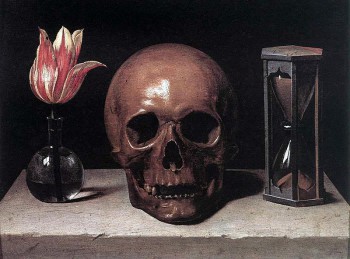
In a Frederic S. Durbin story, you’re as likely to get a chattering, boxed skull secreted away on an enormous mobile city as you are to get an ominous underground world directly beneath a funeral parlor. Durbin writes dark stories with a light touch. His detailed settings come close to becoming characters themselves. Though his audience is mainly a younger crowd, his fantasy novels can be enjoyed by all. All, meaning me. I like his books. You should too. Don’t even get me started on his short stories. I might squeal all over you.
Durbin was born in Illinois, taught English and creative writing in Japan for twenty years and now resides in Pittsburgh, PA. His most recent novel, The Star Shard, was released in February.
Black Gate had a sit down and discovered the secrets of Frederic S. Durbin’s soul. Ish. OK. That’s a lie. More so we booktalked, but if you ask him nicely on his GoodReads or blog, “Mr. Durbin, what secret(s) does your soul hold?”… he might tell you. And if he does, report it back to the big BG so we get the scoop first. In the meantime, here’s Black Gate’s talk with Frederic S. Durbin.
Black Gate: What draws you to writing for a young adult audience?
Frederic S. Durbin: It’s said that everyone has an inner age, an age of truest self. Mine is somewhere between ten and twelve, the kid who sees that the world holds infinite possibility and adventure, and who is just discovering that he has powers that can do remarkable things; the kid who believes there might be a monster on the other side of the hedge. At the latest World Fantasy Convention, I heard panelist William Alexander say, “I love books now, but I’ve never loved books more than I did then” – meaning when he was a kid – so (I’m paraphrasing now) what grander thing can there be than writing books aimed for the time in people’s lives when books have the maximum emotional impact?
For me, there are really only two books in the world: Watership Down and The Lord of the Rings. Oh, yes, there are countless other wonderful books, but those are The Two; and I read them when I was 10, 11, 12 years old. I remember what that was like, and that’s what makes me want to write for a young audience. But notice what’s included in that answer: Watership Down is arguably a “children’s book” on one level, because Richard Adams wrote it originally for his kids. The Lord of the Rings is decidedly not a children’s book, but I read it as a child. So when I say I write for a young audience, I don’t necessarily mean only what today’s marketing departments would label “children’s fiction.” I’m talking about timeless, wonderful stories; that’s what I aspire to.
You also write for adult audiences. How do you know when a story you are telling is going to be YA or Adult reading?
I often don’t know until I’ve gotten a ways into the writing. If it gets too long, if it gets too complex, if it gets too dark or violent, there comes a time when I think, “Okay. This is probably for grown-ups.” That’s not to say that all my stories start out as kids’ stories. Sometimes thematically, I just know it’s an adult story from the outset. For example, “The Bone Man” (Fantasy & Science Fiction, December 2007) is told from the POV of a hit man who is a moral vacuum. I knew right away that wasn’t going to be for Cricket!
When you are writing for a younger audience, how does your writing style change? Is it a conscious choice?
There’s relatively little change because I’m always writing for myself. I never write “down” to kids. If the story doesn’t entertain me, I don’t think it would entertain anyone, and it’s not worth writing. When I know I’m writing for a children’s market, I just have to focus carefully. There isn’t the space for digressions, extensive descriptions, or interior monologues. And of course, I try not to kill off too many characters! When I know I’m writing for adults, I guess there is a kind of relaxing. For grown-ups, you don’t have to be as presentable or quite as responsible. They’re more prepared to make intuitive leaps. They have more life experience, so they will naturally work with you more, for better or worse. Usually for better, I believe.
Who are some of your favorite characters in fantasy?
Elrond. He’s both a formidable warrior (just look to the Second Age!) and a wise scholar.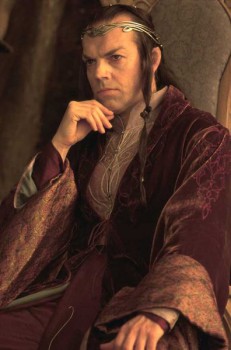
Master Nathaniel Chanticleer in Lud-in-the-Mist. I want to be him when I’m in my fifties.
Molly Grue in The Last Unicorn. I think I understand her. No one writes characters like Peter S. Beagle.
Toad in The Wind in the Willows.
Puck in A Midsummer Night’s Dream (I can count that, right?)
Peter Pan. He is me!
The Star Shard was originally a novella serialized in Cricket, what was the process like of re-writing it as a novel?
Oh my goodness, it was not easy. Imagine that you have a shirt that fits a two-year-old. It’s a perfectly good shirt, complete, functional, newly-laundered. Then you set out to make it fit an adult. You’re defying natural law. First, I took the Cricket story and tried to add more on to the end of it. What I got was two books, uncomfortably joined at the hip, and publishers didn’t hesitate to point that out to me. So then I realized the story should end where the Cricket story ended, but that meant expanding a lot on what was already there, adding subplots and so on. That’s when the hard work really began. A publisher liked my draft, but wanted the characters to be older, about 16-17, with more romance. I tried that and didn’t like it. The editors of a major house did, and they were within inches of making an offer, but they were overruled at the last second by the marketing department. Eventually, we found Houghton Mifflin Harcourt and a wonderful editor who appreciated the original version and let me bring the ages back down again to where they belonged. I did a lot more revision, and finally we have the book as it is today. My editor at HMH is very insightful and wise. This was the most difficult of all ways for a novel to be born. I guess that means it was meant to come into the world. A very significant point is that it was shaped and refined by every one of those stages, even the directions that weren’t right for it. Every step of the odyssey left its mark and its relics. The book is stronger for its long journey.
In The Star Shard, the main character, Cymbril, is a 12-year-old girl. In Dragonfly, your main character is also female. Do you purposefully write female fantasy leads or is that “just the way the story comes out”?
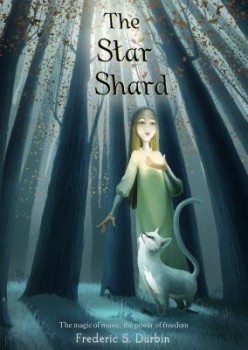 Neither of those were conscious choices, so I guess your theory is right: those were the stories that found me, and those were the characters that stood in front of my desk, hands on their hips, demanding to be written about.
Neither of those were conscious choices, so I guess your theory is right: those were the stories that found me, and those were the characters that stood in front of my desk, hands on their hips, demanding to be written about.
Honestly, I don’t know why cross-gender POV characters aren’t more common. As a guy, I like women. If I’m going to sit in a very narrow seat with someone for 304 pages, I’d much rather it be a fascinating woman than some dude like me.
But for the record, to give you some perspective, I have three novels that have yet to find publishers. In one, the protagonist is a young boy. In another, it’s a man in his thirties. In the third, yes, I’m back to a teenage female POV. In a fourth, which is in the pipeline with Black Gate Books, there are multiple female protagonists. So you’re right: more often than not, I seem to be drawn to female characters.
In The Star Shard, the Thunder Rake, a massive city on wheels, almost becomes a character. How did you come up with the Thunder Rake?
I was considering this question recently, and it occurred to me that the Thunder Rake comes most directly from the old barn I played in as a kid. Like the Thunder Rake, the barn was a place of shadowy secrets – main walkways, ladders, stalls, a loft, and closed-off spaces that only we kids could wriggle into. Like the Rake, the barn had architecture that was added to over the years by different farmers with different purposes, so nothing matched up perfectly. Weird creatures inhabited it, both of the scaly and winged varieties. There were cats and dogs. Danger was ever-present, the possibility of real injury. But it was, in my childhood, a place for kids, a structure that adults had all but abandoned. One farmer stored hay bales there (which became our building blocks), but the horses were long gone. Sun through the blanketing vines filled it with green light. It was stamped with the marks of generations of previous occupants and owners, and yet it was ours alone for the time we were there. That combination of functionality and history, of dimness and memory and mystery – that is precisely the atmosphere of the Thunder Rake.
Would you ever write any other stories aboard the Thunder Rake or about its origins?
Absolutely! Cymbril’s story is conceived as a trilogy. In Book Two, there’s a lot more about the Thunder Rake. I have thought about its origins, too, and that would make a good story as well, how Master Tycho (Rombol’s father) put it together and got it rolling. Before it was a Rake, though, it was already old…
In your books, setting is integral to the plot. Can you think of a setting in another writer’s novel that you wished to all-get-out that you’d thought of first?
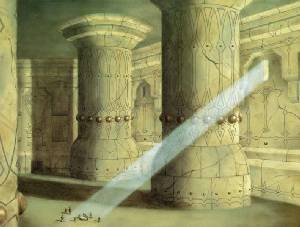
Moria! Or Khazad-dum, I should say, because that’s when it was more visitor-friendly. Think about what Tolkien gave us with Moria. The whole premise of Dungeons & Dragons was spawned by those one-and-a-half chapters. Oh, how the dark mansions of the Dwarves enchanted my imagination as a pre-teen! In the history of our genre since then, the shadow of Moria looms large.
Can you think of a famous setting that you’d love to write in (if only for your own personal fan-fic)?
I thought long and hard about this question, but no, I really can’t. The settings that I love in great works of fantasy are so uniquely the authors’ own that no one else could do them justice. And I have so many of my own that I want to write in…I just don’t have time to think about writing fan-fic!
Are there any quirks to your writing process? (Ex: Jonathan Franzen staring at a blank wall listening to white noise on headphones, Truman Capote could only think while lying down, Carson McCullers had a lucky sweater she wrote in…)
I tend to work out plot problems and answer questions for myself when I’m walking. Long walks seem integral to my writing process. I also do a lot of my best work at a kitchen table or on a park bench – places that aren’t primarily designed for writing, where there’s other stuff going on, but not stuff that’s too distracting. I like to have people nearby who aren’t demanding my attention.
Are you firmly rooted within writing fantasy or are there other genres you’d like to explore?
I’ve tried writing literary fiction before, but invariably, some fantastic element finds its way in. For instance, the closest I’ve done to a non-fantasy story was one that appeared in Cicada in January-February of 2006. Called “A Tale of Silences,” it’s set in a remote mountain village in Japan in 1970, a quarter-century after WWII. It’s about a way of life that’s ending. A new dam is being built which will mean the evacuation of the community, the relocation of people who have lived there all their lives. The main character is an old man spending his last year in the village before it’s shut down. His life is intertwined in various ways with those of his neighbors as they remember the ghosts of their past and contemplate the future – sounds very literary, right? But then the old man meets a giant bear who is the nushi of  the mountain, its guardian spirit…
the mountain, its guardian spirit…
I think I’m rooted pretty firmly in fantasy. But fantasy covers a wide range of writing. As you know, I recently wrote a weird alternate history story. I live on the border between fantasy, dark fantasy, and horror. One reviewer has said that in The Star Shard, “the charm of old-school fantasy blends with the mechanics of steampunk.” I’d like to explore all these subgenres more. The latest piece I’ve finished is a tiny burst of flash fiction that’s a dramatic monologue with no supernatural element.
An idea that’s been returning to me again and again lately, that doesn’t want to leave me alone, is what would be a memoir of one particular year in my life – a story about memory and transition and discovery and family. It would be like nothing else I’ve ever done, and I’m not sure what shape it would take. I guess I’d better not jinx it by talking it to death! But as I understand it now, it would have very few overt fantasy elements – maybe none – except that the world around us and the experiences we go through are all numinous.
What’s the hardest element of storytelling for you? What takes the most work to get on the page?
Oh, man, getting started. I’m a very slow starter, and I will think of a thousand things to do before starting any actual writing. One summer I built two model ships of my own design out of balsa wood, because I wanted to use them as reference when I wrote about events taking place inside and on them. These are ships, with intricate pieces, delicate threads, etc. Then I painted the ships. Then I made some little fired-clay crew members to go on the decks, and I painted those…I’m like an 18-wheeler, a semi truck: once I’m rolling, there’s mass and power in the momentum, and I can keep up a high wordcount day after day, and that’s when I’m happiest. But it takes an awful lot of force to overcome the inertia and get all that moving. Like all writers, I’m miserable when I’m not writing, but I find ways to prolong that misery. Then it’s like a static charge builds up, like a thunderstorm moving in. I get more and more agitated. When it’s unbearable, there’s an arc, a lightning bolt, and I start writing, and there’s blessed relief. I know, this sounds like a certain brand of insanity. I suppose that’s what writing is.
Do you know your ending before you start writing?
Yes and no. I know it as you might know a relative you haven’t met. You know about this person; you’ve heard the family stories, seen a photo or two. I don’t know many details of the ending, but I know very generally what has to happen. Discovering all the territory and events along the way are, for me, what keeps the book alive and interesting. When I get to the ending, it’s never quite the ending I thought I knew, but I understand why it is that way.
You really can’t make your characters do anything- or you shouldn’t, anyway. They act and think like the living people they are, and the paths they take are what shapes the ending.
Speaking of endings, if you could butcher the timeless prose of a past author and change someone’s ending…is there an ending in literature that you’d change? For example, (SPOILER) I seriously wanted Jo to end up with Laurie in Little Women. I know why it didn’t happen. I get it. But…come on, they didn’t even really get a chance and then he ends up with her sister? UGH. What endings in lit left you wanting?
You’ve stumped me again. I’ve scoured my memory, and I just don’t have any such experience. Yes, there were endings that upset me. I remembering during free reading time in first grade when I finished Charlotte’s Web, and I was sitting there at my desk crying buckets, hoping no one would notice. The ending hurt, but I was crying over how right E.B. White was. That experience made me realize how powerful books can be. I knew that I wanted to write books like that, or die trying.
At WFC 2011, I had the honor of hearing you read a story that was chock full of pig-spiders, guns and action hero adventure. Do you have any more Die Hard fantasy thrillers to be told?
I would like to produce a whole collection of stories about that same main character in the same general setting. That story was a delight to write! There are so many possibilities to explore there. Yes, I love action sequences. They’re the easiest scenes in the world to create, and telling an action story is therapeutic.
You spent a large number of years working as a teacher in Japan. Do you think that your ex-pat experiences have affected your writing or the stories that you want to tell?
Yes. Everything we live through affects our writing and our perceptions of story. For one thing, I’ve been an alien in a different culture, so when I write about the encounters between characters of different species or different worlds, I have some real emotional truth to draw upon. There are commonalities that link sentient beings together, but there are also real differences in thought patterns, reflected in language and culture. I’ve waded neck-deep in those differences. I’ve swum in them!
What’s funny is when the Japan part of my life influences a story in ways that I don’t realize. One of my test readers was confused about a strange bathtub I had included in a story. When she asked what was going on, it dawned on me that it was a Japanese-style bathtub. I’d been there for so long that I wrote it that way without thinking.
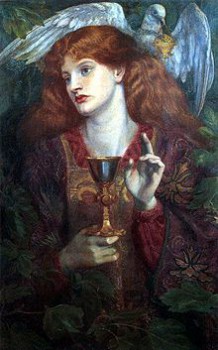
I think the perspective of having lived overseas has broadened my view of things, which helps me as a writer. The world is wider and older than we are usually conscious of. There are cultures besides ours.
Are there any stories you’ve wanted to write, but you can’t corral onto the page? Is there a Holy Grail of Durbin writing yet to be done?
Oh, wow. That book I made those ships for . . . I started that eighteen years ago. I spent the first five years (after the model-making) producing a version that I thought was finally ready to show to editors and agents, and everyone hated it. It was as inaccessible as Ulysses, with none of the brilliance of James Joyce. Then I spent another several years writing a radically different draft with a greatly different plot using the same characters and basic premise, but with a more focused storyline. This time, instead of the pros, I showed it to a few friends. Again, the response was underwhelming. I wanted people to fall in love with it, but they were like, “Wow. That’s…complex.” The thing was about 150,000 words long.
What happened was this: I was creating a world from scratch, and it was so different from our own that human readers were lost. They had no footing on which to base their perceptions. Out of 338 single-spaced pages, 49 of them were glossary. Can you imagine a fifty-page glossary that you really need to refer to all the time? I would have sentences in the text that were more than half in the jargon of the story’s world. And that’s just not cool. I’d spent so long with the world that it all made sense to me, but it didn’t to anyone else.
I haven’t worked on it for a long time. Someday, hopefully before much longer, I’d like to go back and rework it. I’d like to keep the richness and grandeur, but make it comprehensible and compelling. Yes, that’s a Holy Grail, because I don’t know yet if it’s doable.
Are you at all worried or interested in the shift of reading from book to e-book?
I’m not worried. It’s one of those things that there’s utterly no point in my worrying about. Since I’m still thinking about that book I was just describing, I’ll draw an analogy. In one of the rare lucid moments – heh, heh! – there’s a scene in which a tiger-like beast charges from the jungle into a semicircle of men who are on the ground, at the foot of some scaffolding. No one is significantly armed and no one has time to climb to safety. It becomes simply a question of which man the predator will choose.
All the shifts we face as writers and book-lovers are like that, in a way, and I don’t mean it to sound fatalistic. E-books are emerging. Brick-and-mortar bookstores are vanishing. Mid-list careers are disappearing. We can’t control these things, and we can’t run.
What we have some control over is what we write. We can calmly keep telling our stories, singing from the depths of our souls, and trusting that stories endure.
Am I interested? Yes, I’d like to try out an e-book. I don’t expect I’ll like it as well as I love the heft and texture and smell of a real book, but if someone gave me an e-book, I’d use it.
Speaking of reading, what was the last great book that you read?
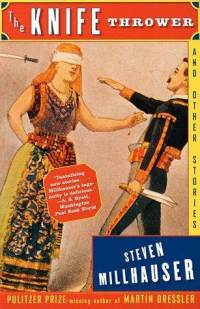 I thought Roger Zelazny’s A Night in the Lonesome October was a lot of fun. I don’t know if “great” is the right word, but it was clever, unique, and highly enjoyable. It belongs on the smallish shelf of books I’d like to revisit. This one is especially good for the Hallowe’en season.
I thought Roger Zelazny’s A Night in the Lonesome October was a lot of fun. I don’t know if “great” is the right word, but it was clever, unique, and highly enjoyable. It belongs on the smallish shelf of books I’d like to revisit. This one is especially good for the Hallowe’en season.
The last great book I read was probably Steven Millhauser’s The Knife Thrower and Other Stories. Millhauser is a virtuoso. I love this book and his Enchanted Night novella with a passion.
Are there any bookstores (online or brick and mortar) that you wanna give a shout out to?
I would most certainly like to thank Beyond Bedtime Books in Dormont, Pittsburgh and Penguin Bookshop in Sewickley, Pennsylvania for hosting book-launchings for The Star Shard! Readers can watch my web site for the dates and times. (Their addresses and phone numbers are on my site, too.) All we know so far is that the event at Beyond Bedtime Books will be on April 21st, and that the composer of the book’s music, Dorothy VanAndel Frisch, will also be present!
I’d also like to thank Barnes & Noble for stocking, in most cases, multiple copies of the book in their stores! Hurray!
There are six vendors listed on my site, all clickable links, all places where The Star Shard is available. They are: Amazon, Barnes & Noble, Books-A-Million, Houghton Mifflin Harcourt, IndieBound, and Powell’s.
What about favorite libraries that people should visit if they are in town?
Here in Pittsburgh, The Place to Go is the Carnegie Library. It is sprawling and totally tremendous, with locations all over the area. On my blog, I recently posted an aerial view of the main branch. When I visited Pittsburgh before moving here, the Carnegie Library was a big plus in this town’s favor. It even has dinosaurs!

When he’s not batting interruptive Black Gate interviewers away with a big stick, Frederic S. Durbin can be found writing novels and teaching creative writing workshops. He’s a member of the Society of Children’s Book Writers and Illustrators and also of the Science Fiction and Fantasy Writers of America. He lives in Pittsburgh, where he is fascinated by the bridges and the meandering city stairways; he believes the forested hills must be full of stories that need telling.
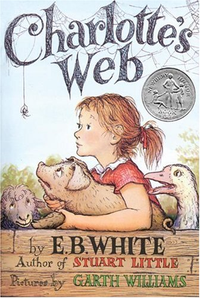
Go, Fred, go! Great interview…
Thanks!
Another doozy, Dread! Thanks! You made me wanna read his stuff.
I’m telling you Cooney, once he writes that series of stories set in the West with the pig spiders…I’ll die from happiness. Or at least pass out.
Great job Patty. Really enjoyable interview. Now I must hunt down a copy of Star Shard.
Great interview Patty (and Fred!)
Fred’s pig-spider story will appear in Jason Waltz’s upcoming DISCOVERY anthology. We’ll be sure to announce the pub date here as soon as we have one.
[…] Frederic S. Durbin’s previous novel was Dragonfly, published in hardcover by Arkham House in 1999. If you have not heard him read one of his delightfully stories out loud, you are missing one of the great pleasures of the fantasy genre. You can read Patty Templeton’s Black Gate interview with Fred here. […]
O’Neill…you should get me a galley of it, whenever Discovery becomes available. PEAS! I’ll be your bestie. Or beastie. Whatever.
[…] Black Gate (Patty Templeton) interviews Frederic S. Durbin. […]
[…] incomparable Patty Templeton has interviewed me for Black Gate, and you can read it here. That’s pretty much the news, because I can’t possibly add to the job she’s done. […]
Now I want to read the trunk novel. That actually sounds like exactly my kind of thing. It can’t be harder to follow than the jargon-saturated passages in Patrick O’Brian. I once asked the person who introduced me to O’Brian’s books what she most looked for in his battle-at-sea scenes, and she replied, “A sentence I understand.” But damn, we both loved those books.